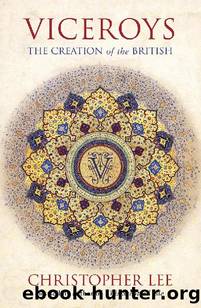Viceroys: The Creation of the British by Christopher Lee

Author:Christopher Lee [Lee, Christopher]
Language: eng
Format: epub
Publisher: Little, Brown Book Group
Published: 2018-08-30T00:00:00+00:00
CHAPTER XI
CURZON
India easing into the twentieth century was not just about India; it was about the British. India represented a 300-year-old investment that the British could no longer afford, in spite of what turned out to be Indiaâs contribution during two worldwide wars together with the cultural contributions to British society. India, we should remember, was considered one of the top ten industrial countries in the world. Britain was overwhelmed by domestic considerations and had been the previous century too, but in those years politics, although as eventful, had a different pace and had fewer consequences for fewer people. Whatever the form of government, every administration was occupied in its own parliament with seemingly weekly challenges â Ireland, the economy prior to and after the First World War, the Gold Standard debate, emergence of new political rivalries, the failure of the League of Nations, the emergence of Communism after that war. It took a lot of optimism to believe that India would always be there and that the road to it not being there would be free of confusion and continuing tragedy. Few had imagined the social legacy of post-empire.
Some images were suspect. There were questions about the long-term consequences of the Mutiny even to the extent that it had been more than a single event. The fact that nearly forty years on, both Indian and British still wondered if there was unfinished business and that there only had to be a single incident to set fire to India. Equally, there was no real everyday tension about Britainâs position as ruler of India; there was, however, an active debate about what it would take to challenge British rule. People were asking when India would begin to demand self-government and who would lead the Indian side in that debate. The part answer was that Congress existed and the Muslim League was about to be formed. The bigger questions therefore were when and who. Within a decade the names Jinnah and Gandhi would be known to all India. Throughout all this, the country would run reasonably well because the best apparatus devised by the British, the Indian civil servant with testing entry standards, was on the whole remarkably efficient and a fair way of book-keeping India.
As for the white Mughal, he was one of the most powerful leaders in the world. He ruled without real question 300 million people who knew the rules of his reign; the most efficient of all Asian armies kept the less agreeable in step. Meanwhile the civil service explained or made mystery of every regulation and collected not all, but enough taxes to run the country. When Britain claimed to be a great power it needed to be reminded that the strength rested in a developing industrial power in which Britain had invested since the early seventeenth century and from which it had taken generous dividends ever since.
These conditions and industrial, constitutional and political facts had not each and every one come to pass when Curzon ascended
Download
This site does not store any files on its server. We only index and link to content provided by other sites. Please contact the content providers to delete copyright contents if any and email us, we'll remove relevant links or contents immediately.
| Africa | Americas |
| Arctic & Antarctica | Asia |
| Australia & Oceania | Europe |
| Middle East | Russia |
| United States | World |
| Ancient Civilizations | Military |
| Historical Study & Educational Resources |
Magic and Divination in Early Islam by Emilie Savage-Smith;(1194)
Ambition and Desire: The Dangerous Life of Josephine Bonaparte by Kate Williams(1084)
Operation Vengeance: The Astonishing Aerial Ambush That Changed World War II by Dan Hampton(985)
What Really Happened: The Death of Hitler by Robert J. Hutchinson(868)
London in the Twentieth Century by Jerry White(844)
Time of the Magicians by Wolfram Eilenberger(842)
Twilight of the Gods by Ian W. Toll(811)
The Japanese by Christopher Harding(795)
Papillon by Henry Charrière(793)
Lenin: A Biography by Robert Service(778)
The Devil You Know by Charles M. Blow(777)
Twelve Caesars by Mary Beard(764)
Freemasons for Dummies by Hodapp Christopher;(747)
The Churchill Complex by Ian Buruma(729)
Napolean Hill Collection by Napoleon Hill(701)
The Enlightenment by Ritchie Robertson(690)
Henry III by David Carpenter;(685)
Bohemians, Bootleggers, Flappers, and Swells: The Best of Early Vanity Fair by Bohemians Bootleggers Flappers & Swells- The Best of Early Vanity Fair (epub)(681)
The Rise and Triumph of the Modern Self by Unknown(653)
